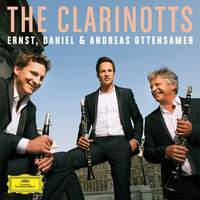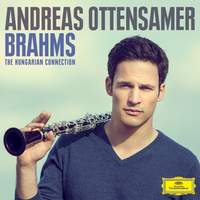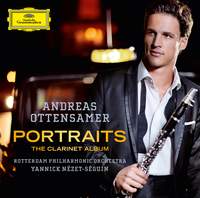Interview,
The Clarinotts
 The Ottensamer family have been described as the Royal Family of Austrian clarinet-playing - a father and two sons who between them comprise the Principal Clarinets of the Vienna Philharmonic, Vienna State Opera Orchestra and Berlin Philharmonic. They also play as a close-knit trio, the Clarinotts, and their DG début comes out on January 1st. It features a wide variety of works showcasing the clarinet and its variants in numerous combinations - including a special composition by the Hungarian composer Korény Béla.
The Ottensamer family have been described as the Royal Family of Austrian clarinet-playing - a father and two sons who between them comprise the Principal Clarinets of the Vienna Philharmonic, Vienna State Opera Orchestra and Berlin Philharmonic. They also play as a close-knit trio, the Clarinotts, and their DG début comes out on January 1st. It features a wide variety of works showcasing the clarinet and its variants in numerous combinations - including a special composition by the Hungarian composer Korény Béla.
David caught up with Andreas (the younger son) on the phone to talk about this unique ensemble, and about the experience of being brought up in a modern musical dynasty.
What was it like to grow up in a household so dominated by the sound of the clarinet? Were you ever tempted to rebel by taking up, say, the double bass or the horn?
Actually it wasn't dominated that much only by the clarinet, because my mother is a cellist - so I had the two instruments very present at home, and also the first instrument I played was the piano, actually! So it wasn't all about the clarinet from the very beginning on. At the same time, of course, the sound of the instrument and the natural presence of it always, I think, subconsciously was a part of my upbringing. So it always felt very natural to be surrounded by the sound of the clarinet.
The makeup of your ensemble is a little unusual, at least compared to string quartets or wind quintets. Do you find there’s enough clarinet-trio repertoire to keep your musical appetites satisfied, or do you constantly have to search out (and indeed arrange) new works to keep your repertoire fresh?
I have to say, we were quite surprised by how much there actually is. Initially we thought, there’s not going to be anything! But then we started looking and we found even some Mozart – you know, the Divertimenti. There is a lot from that time, actually, from not-so-well-known composers who wrote beautiful music – Hummel or Druschetzky or whatever – and then there’s also quite a lot from early modern times, so to speak – French composers, where we have really beautiful pieces. And then of course what we do is we also take double concertos with orchestra and that sort of thing.
And we have to (but also like to) look for new stuff, new pieces, and we have quite a few concertos and pieces now dedicated for us and written for us by composers who we know, who are friends with us – so that’s something very interesting because you get to shape the style of the piece a little bit in the process of it being written.
And the third component of course, as you say, is the arranging. We do that a lot ourselves, and also have people doing this for us, so we kind of get access to the best of the repertoire that works for the three clarinets.
The most substantial work on the album is the new commission, Cinema 1– did you have any input into the compositional process of this fascinating piece?
It depends on the situation. With this particular piece on the CD we didn’t really have any impact. We wanted to let Mr Korény have his freedom all the way, because we know that he is capable of writing for the clarinet, and the idea of the piece was really to be as close as possible to the film music of Basic Instinct in the atmosphere of the piece. So we didn’t really want to tell him anything about what we wanted, but we wanted him to really dive into the atmosphere and see what he could produce for the possibilities of our instruments.
But there are other situations – for example now we are going to have the world premiere of a new triple concerto for us in January with the Vienna Philharmonic, so that’s going to be very exciting, and for this piece we were talking a lot with the composer Ivàn Eröd, we were talking a lot about the options and possibilities, what we like, what probably works best. So there’s different ways of approaching that.
You’ve been playing together as a trio for over ten years now; as players used to leading sections, or at any rate performing as principals, do you find there’s any artistic rivalry or competition among you when you come to play as a trio?
Well, I would say even more than being used to being section leaders, we’re used to playing together! Because that was the very first thing all of us did, my brother and me – when we first picked up the clarinet, from the first moment on we played together. So I don’t think we’ll ever get to the point where we say it’s unusual for us to play together. But of course just character-wise and personality-wise, there are difficult situations, because all three of us have very strong opinions about interpretation and ways of shaping things, and as we are family we don’t really have these boundaries of addressing problems in a polite way – we just face the truth! It’s kind of a direct way to work, but I think that’s the best way to do it.
You’re playing during the intermission in this year’s New Year’s Day concert from Vienna – can you give us any hints as to what you’ll be performing?
Absolutely! It’s a great honour – for me especially, as I’m normally not part of that production – so it’s really great to have a foot in the door there through the family trio. We’ll be playing two of the pieces on the album, so it’s a perfect insight for people as to what they’re going to be expecting from the CD, which will be released on the day of the New Year’s Concert. We’re just happy that many people will have the chance to have short glimpses of what they could hear if they want to.
You refer to a distinct Viennese school of playing, based on a slightly different design of instrument (a distinction that is echoed in the oboe and horn sections as well). But in general, orchestras today have much less of a unique sound than was the case fifty or a hundred years ago, and instruments are much more homogenous. Do you think the “Viennese” sound can last?
It’s much more about schools, you know? More than instruments. It’s much more about traditions you want to value or ways of articulation or interpretation in general. And that’s what would be a big loss, I think, if it didn’t last. It’s the same for other orchestras, of course, but I think especially in Vienna, because they tend to try to take new members who have a sort of connection with the Vienna way of playing. So that’s something quite special, so it can only be a good thing to preserve that.
With the clarinet, also… of course we do play a bit of different instruments but if I have to play another model of instrument I would still try to have my sound, my way of playing. So it doesn’t really end with the instrument.
The Clarinotts will be released on Deutsche Grammophon on 1st January.
Available Formats: MP3, FLAC, Hi-Res FLAC
Other recordings featuring Andreas Ottensamer
Andreas explores the Hungarian heritage of Brahms's clarinet music, rediscovering the folk roots of much of his writing.
Available Formats: MP3, FLAC, Hi-Res FLAC
An eclectic album taking in Spohr, Debussy and jazz-inspired writing by Copland and Gershwin.
Available Formats: MP3, FLAC, Hi-Res FLAC





